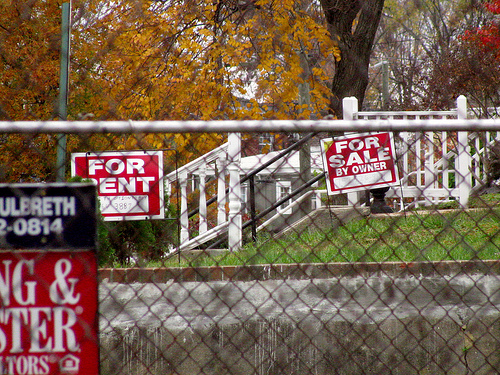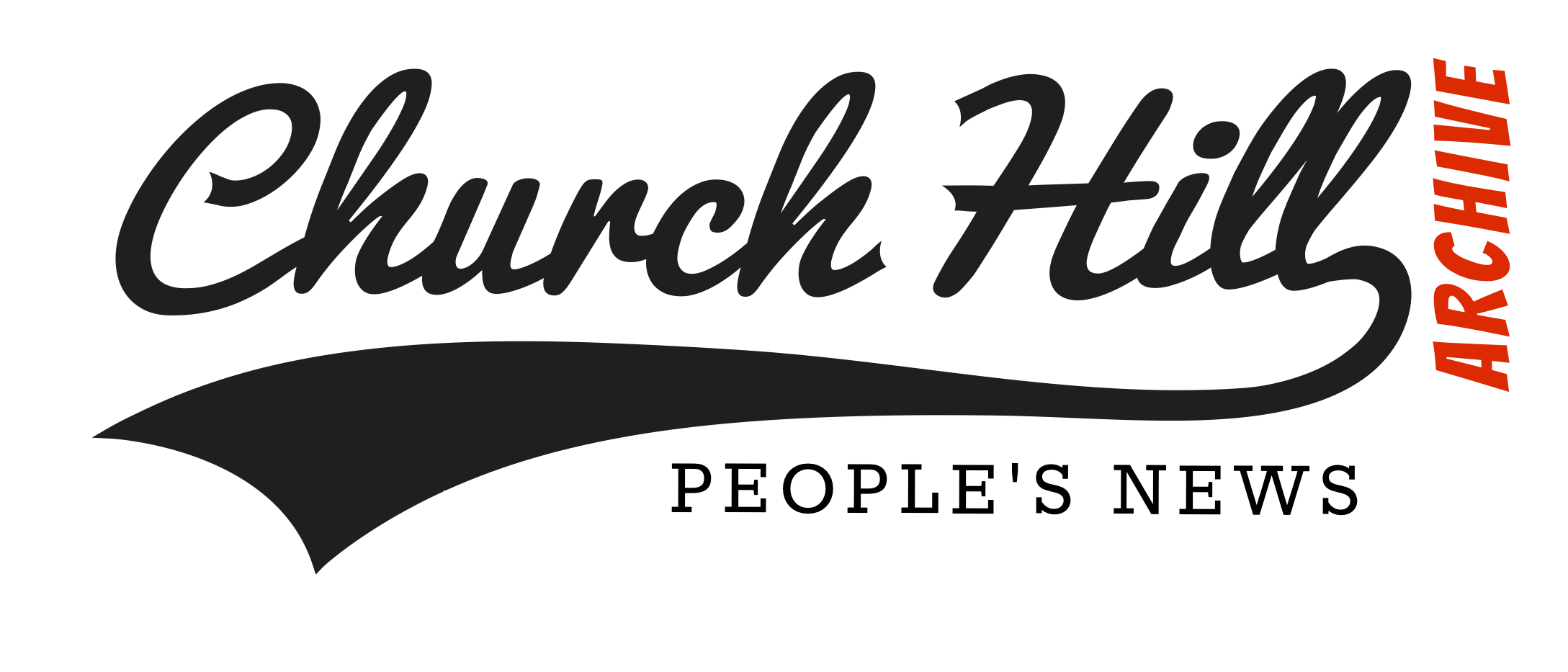RECENT COMMENTS
Eric S. Huffstutler on What is up with the Church Hill Post Office?
Eric S. Huffstutler on What is up with the Church Hill Post Office?
Yvette Cannon on What is up with the Church Hill Post Office?
crd on Power Outage on the Hill

Are foreclosures a particular problem here?
11/19/2008 6:16 AM by John M
An article in today’s RTD, Housing prices decline 8.8% in Richmond area, says that foreclosures are hitting our area harder than some:
Foreclosures in Church Hill and Highland Park, for example, are pushing prices down in those neighborhoods. “But they are having virtually no effect in Henrico County’s West End. Nor are they affecting Glen Allen.”
TAGGED: real estate






Around us they are a bit of a problem, not in the same sense as nationwide though. The foreclosures I’ve seen around here have been on flipped homes that didn’t sell.
“Flipped” in what context?
Eric, I’m assuming “flipped” in the context of someone scooping up a property that needs work for a low price, doing a renovation (unfortunately sometimes not the most loving or historically correct one) and putting it back on the market quickly to make a profit.
I don’t see foreclosures being more of a problem in Church Hill than in other parts of the city. There are knots, though. I know there are several foreclosures that are either for sale now or have recently sold in the 500 block of Chimborazo. That said, I remember being in Henrico during one of my rare trips outside of the city limits and being able to see three foreclosures from the corner where I was stopped in a subdivision. So nowhere is immune.
Um… in the “flip that house” context. “Renovations” if you prefer that. 😉 The point was that I have not seen owner occupied houses that have gotten foreclosed on.
I have seen a couple of renters get kicked out because the owner got foreclosed on though, that is relevant to this too.
Daniel…
Like Anne, I am guessing that it depends on the quality and correctness of the “renovation” which can hamper a sale.
Usually younger people (under 30) do not want to bother with an older home or one “restored” in the historical sense but want something low maintenance and new inside. Unfortunately that sometimes mean those quick and cheap “flips” that destroy our older homes within the neighborhood and older people interested in quality are turned off from. (and lets not get into another older vs. younger tantrum)
Eric
In Battery Park, there are some foreclosures but it appears to be investment houses. Houses that people purchased used as rentals and also cashed out the equity.
Eric, I hope it will warm your heart to know that many of the younger buyers to whom I show houses in Church Hill want the period details and the quality renovations; that’s why they chose Church Hill!
I sold the lovely 23rd Street renovation that was featured on this blog a few months ago to a wonderful (young) friend and client — we ruled out many houses where unfortunate renovations had stripped gorgeous old homes of their history. Newer humans don’t necessarily want newer homes….
Don’t worry Eric, I’m outside the historic districts. Over here I just care about getting people into homes. I couldn’t care 1 cent how historic the homes around me stay.
nbc12 has picked this up, too:
Sadly, 3013 Libby Terrace just got foreclosed on Nov. 11…bank now owns it. A peek at the Trustee Sales in the legal section of Times-Dispatch tells the true story.
brian liggan has a company that specializes in houses of the last resort. when this bottom feeder represents a home its because nobody else could sell it. kinda like the island of lost toys from rudolph the rednosed reindeer. him and his brother have va.capital a company that is the last stop for properties with no hope of selling. naturally he would say foreclosures are up ,he specializes in human misery. take a look around just about every house they represent has issues. touting this guy as an expert is akin to saying thatthe kkk is an expert on black culture.since he sells mostly to investors and flippers i guess he might qualify as an expert in shoddily renovated overpriced properties sold primarily to folks who soon get upside down like a guy who buys a used yugo and soon owes more than its worth. once its repoed i.e. foreclosed liggans company can sell it again.talk about a fox in the henhouse!having dealt with this company once before i can vouch for the fact that the liggans make sharks look people friendly. of course i dont mean any of this in a bad way.i mean after all he is a local old boy bidnessman right?buddycorbett
Housing problem expands in state (RTD 1/4/09)
I’ve been looking at Richmond investment property for a little over a year now. Investing with the intent of restoring them and selling them. The majority of what I have seen, that appealed to me, in Church Hill ended up being foreclosures of properties bought by investors at the peak of the buying rush in 2007 with the intent to do a quick flip and they dropped the project. I saw personal home loss (foreclosures) outside of Church Hill.
Anne… I’ve got a beautiful little gem that will be on the market in late January/early February that would appeal to those younger (and older) buyers of yours 😉 -http://www.314n36thst.com/
RE post 11: Virginia Capitol does work mainly with banks, from what I have seen. They represent the bank, not the purchaser. They have been working this niche since long before the foreclosure rate increased to what it is now.
For anyone who is interested in going the forclosure route as a purchaser, I would highly recommend that you work with a REALTOR who is there to represent your best interests, and who has experience dealing with the foreclosure process. It is a much different transaction than working with a standard seller who is wanting to sell their own private residence.
Shannon is right – dealing with a bank is a whole other world. All they have is a number they want to reach – nothing is personal. You’ll need a good realtor on your side. They “seem” more open to homeowners rather than investors when it comes to multiple offers on a property even when it is a cash offer over financing… would you agree Shannon?
I’ve dealt with foreclosed properties from the buyer agent side and I agree with Shannon that a realtor should be your guide through all the paperwork and b…s… that the banks throw at you. The one lesson I learned is that in foreclosures, there is no right to inspect and have repairs done. The property is ” as is”, with no exceptions. You will find that, a lot of times, the owner knows that a foreclosure is coming and will neglect maintenace, or, in a worst case scenario, will trash the place, or strip it of everything that they can. So a foreclosure may be a good deal on paper, but check it out, thoroughly, before signing a contract. A buyer should read all the bank documents carefully, and get the advice of a realtor before agreeing to anything.
Regarding Deanna’s question: It costs banks a lot of money to have a large inventory of real estate. In fact, they can get in trouble for owning a disproportionate amount of homes. My take is that they are wanting quick, reliable payment, first and foremost.
Quick – Cash money can often mean a lightning fast settlement because no lender underwriters are involved to examine the Purchaser’s credit-worthiness, and the property does not have to meet any certain standard of livability, per appraisal, like it does with a regular conventional or FHA loan. 203K loans are a different story, but they are pretty hard to get right now, from what I have seen.
Reliable – Financing can go awry, which is another reason that banks often will choose a cash offer. I have seen banks accept a good amount less in payment for a deal that was more of a sure bet – a bank statement as proof of financial viability. It seems that what is most attractive to banks is the least amount of variables, or contingencies.
As far as response time, each bank seems to have its own game plan. Some are more organized and timely. Some are a joke with how long they can drag on a transaction. This is a difficult thing to communicate to a Purchaser sometimes. Even when the unknown time frame is explained from the beginning, the waiting can make a buyer very, very antsy – especially if they plan to occupy the property. Understandable, since it’s hard for them to make life plans around such an unknown. If they can stick it out, though, it’s possible to get some great instant equity.
While it would be nice to think that banks have a concern for the neighborhood, I don’t really know they are the least bit invested in a house being owner-occupied, actually. I have found that they seem to just want to get another house off their books as fast as possible.
Regarding Bill’s comment – unless my client is a licensed contractor, I always put an inspection contingency in there that says we can walk without penalty if a licensed inspector finds that the repairs exceed an acceptable scope. So we know the banks won’t do any work, but we can bolt if the work is turns out to be too much for the client.
It used to be that foreclosures were usually in horrible condition, like my own home was – big heaps of neglect with live ammunition, drug paraphernalia everywhere, and holes punched in the walls . What I am finding more and more these days, though, is that they are just dwellings that used to belong to folks who fell on hard times, and often the properties are in pretty good shape.
Standard disclaimer – this is just my take, based on the purchase of my home (foreclosure,) and the experience of helping others with the purchase of bank-owned properties and short sales. I have never worked the banks’ side, so I don’t claim to have any inside knowledge on their position at all.